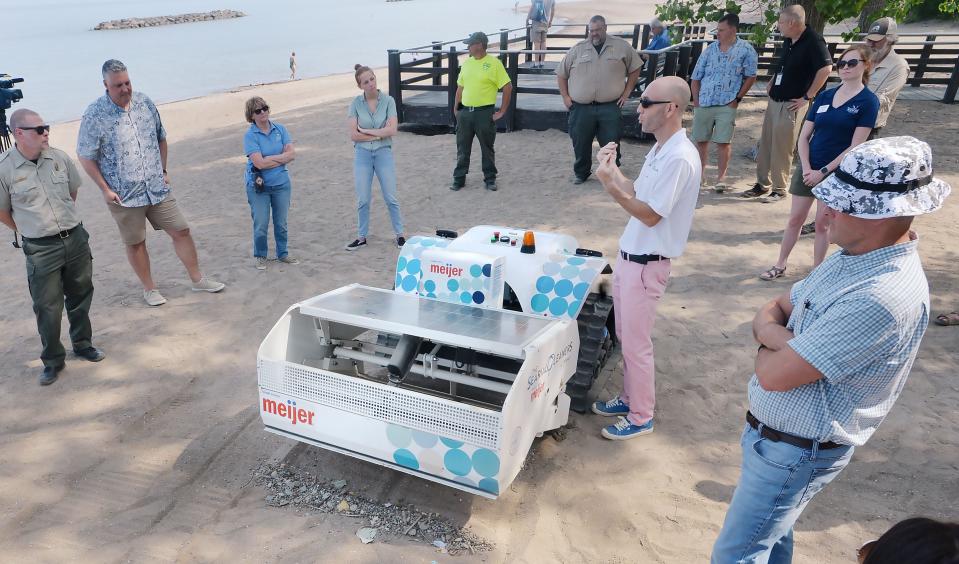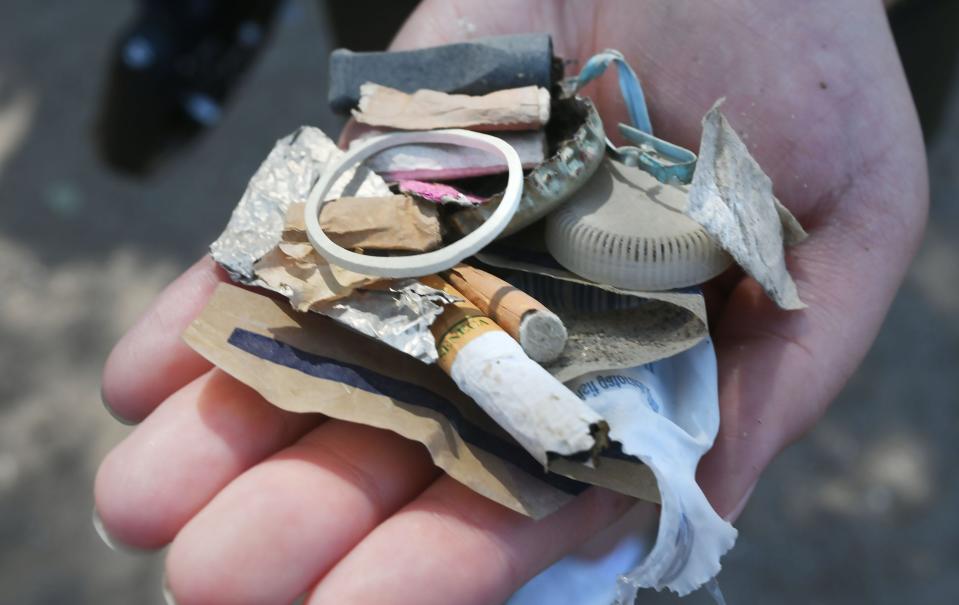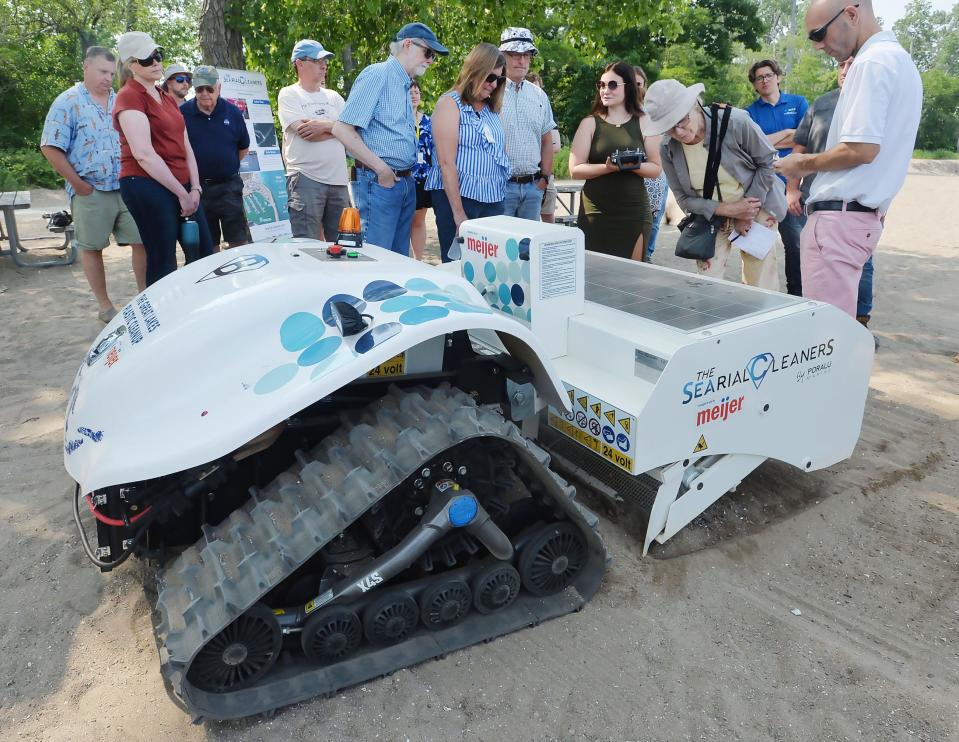Are beach-cleaning robots, drones the future of Presque Isle State Park's cleanup system?
A robot won't solve the problem of plastics pollution on Presque Isle State Park beaches but it could be part of the solution.
Gautier Peers, sales and partnership associate for The Searial Cleaners by Poralu Marine, said that in his 37 years of life, plastics pollution has increased exponentially.
"Especially in the last 10 to 20 years, it's everywhere," he said.
Peers demonstrated his company's beach-cleaning robot and displayed a floating waste collector drone during Tuesday's meeting of the Pennsylvania Lake Erie Environmental Forum. About two dozen people attended the PA LEEF meeting in the Rotary Pavilion at Presque Isle. The BeBot beach-cleaning robot was demonstrated on nearby Beach 7.

"Nobody wants to go to a beach that's full of trash," Peers said.
He said automated solutions like the BeBot and PixieDrone are better and more economical than manual cleaning.
However, Peers said, "With the technology, we can mitigate the problem. We can't solve the problem."
A solution, he said, would involve changing people and their use of plastics and improper disposal of plastics. But until that happens, BeBots and PixieDrones could help.
Plastics pollution problem
The Great Lakes, including Lake Erie, provide drinking water for 40 million people, said Ally Walker, program officer of circular economic programming for the Council of the Great Lakes Region. At the same time, an estimated 22 million pounds of plastic is entering the Great Lakes every year, she said.
Report: Great Lakes beaches, including Presque Isle, suffering from plastic pollution
Larger plastics break down into microplastics that can be harmful to wildlife and even end up in humans.
"All this plastic has an impact on human health," Peers said.
Only awareness will be able to fix the problem, he said. But BeBots can help educate people about plastics pollution.

"People love robots," Peers said. "Because we can catch their attention with the machine ... we can explain how plastic breaks down into microplastic."
What is a BeBot
The beach-cleaning robot runs mostly on batteries but can be solar powered. About a meter at its highest and a littler wider than that, it weighs 1,400 pounds and runs on tracks over its wheels to provide less pressure on the sand and not contribute to erosion. Peers said its batteries can last up to three hours, it doesn't produce exhaust fumes and is quieter than other beach-cleaning machines.
A BeBot can clean about 32,000 square feet of beach an hour, he said. In about a 30-foot span during the demonstration, it picked up numerous cigarette butts, plastic bottle caps and even a bread bag clip. Peers said organic materials like rocks that it also picks up are placed back on beaches.

The BeBot was operated by remote control. Peers said it's not autonomous because it can't anticipate when a child or animal might dart in front of it. Plus, if there's no operator, there's no one to interact with people seeing the robot, he said.
Peers said his company is considering an autonomous BeBot for night use when beaches are empty.
What is a PixieDrone
This drone moves in water, collects floating waste and can be operated with a remote control or autonomously. It has a 160 liter collection capacity and up to six hours of operation, according to The Searial Cleaners website.
It also fits in the bed of a pickup truck, where people at the PA LEEF meeting were able to view it Tuesday.
Will Presque Isle use the beach-cleaning technology?
Walker, from the Council of the Great Lakes Region, said there are no BeBots or PixieDrones operating in Erie but her organization hopes to develop partners to get some of the devices here. She said her organization also provides stipends to help put the technology out there.
A BeBot costs about $150,000 to purchase and run for one year and about half that to operate in following years, she said.
Leave no trace behind: Trash a growing problem at Presque Isle State Park, where visitors leave litter behind
Presque Isle Operations Manager Matt Greene wasn't quite ready Tuesday to order one for the state park. He said that the scale of Presque Isle, with seven miles of shoreline, is daunting and likely couldn't be covered by just a BeBot.
"Maybe this becomes a part of our system," Greene said.
The park now cleans its beaches with a Barber beach groomer, which he described as a tractor that pulls a rake. Greene said it is quicker than a BeBot and covers more ground at once. While it can pick up cigarette butts, it doesn't remove pieces as small as the BeBot can, he said.
Dana Massing can be reached at dmassing@timesnews.com.
This article originally appeared on Erie Times-News: Robots aim to help with plastics pollution on beaches like Presque Isle

